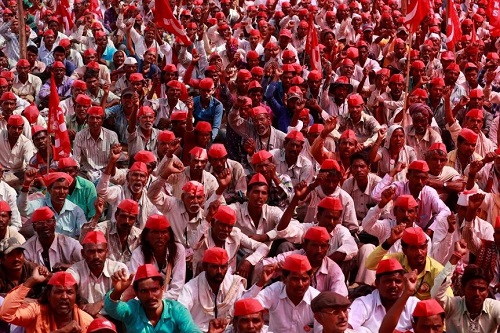Reuters photo
By
Ananya S Guha
The farmer’s agitation is in fact an uprising, but a peaceful one. Irrespective of caste, community and religion farmers all over Maharashtra gathered in Nasik to walk, literally walk to Mumbai. The participation of tribal farmers shows how the issue of forest land was abysmally ignored by the authorities. So was the M.S. Swaminathan panel report. The farmers have called off the demands due to the government’s acceptance of their demands. The question is what is the supposed acceptance? Are they put in writing, for example total waiver of loans or the acceptance of minimum price? Critics have taken pains on the media to show that it is ethically wrong for waivers, since some farmers have started repaying their loans. It is not a question of ethics, but that of amelioration of their condition, which is again conditioned, not only by pecuniary limitations, but also by crop failure due to weather conditions.
This farmers’ unrest has pointed to their insufferable condition, which could not be tolerated any more. The discipline with which they have conducted themselves, protected the city of Mumbai, not disturbing examinations is an example of how the common man or woman in India has wisdom, unlike the politicians who seem to be losing sight of such innateness day by day.
Secondly the agitation has brought to fore the ancestral voices of tribal people inheriting land in forests from their forefathers. What benefits will they get in working in their soil of ancestral roots? The ancient voices of tribal India are now strident. The Maharashtra government’s initial apathy has changed into some action in words. Mere lip service however will not do. The voices of the masses will further unite. Farmers in other parts of the country are waiting.
The minimum price demand had to be foreseen. It was not. Now it has to be implemented. The problem of suicide dovetailed as it is with both family and social problems has to be appropriately challenged, not by doling statistics, but by very appropriate causal assessment.
The masses and the classes are the infinite legitimate social modes of inquiry and tools in our country. If the classes do not understand the rigors and demands, and the predicament of the masses there can only be such uprising. The farmers by taking resort to non violent methods, which is a fine demonstration of primitive wisdom has voiced expressions of a hitherto voiceless society. The educated and political classes can take a leaf out of these pages of a narrative, silent and untold all these years, but given a solid voice now. We all know of a similar plight in Rajasthan, Madhya Pradesh, Chhattisgarh and other states. The protest of the farmers may create all India ripples. It indicates how the agrarian sector has been neglected all these years, and how only wealthy farmers were only paid attention.
It is a social crisis arising out of dire social and economic needs. It is the dawn of unity among the masses in a befitting and non violent manner. It is the pathos and the tragedy that should strike our conscience, the national conscience. The acid test is that of ALL political parties coming together in one voice to settle issues permanently. Will They?
Ananya S Guha
Ananya S Guha was born and brought up in Shillong, North East India. He has seven collections of poetry and his poems have been published worldwide. They have also been featured in several anthologies. He is also a columnist, critic and editor. He now is a Regional Director at the Indira Gandhi National Open University and holds a doctoral degree on the novels of William Golding.



No Comments Yet!
You can be first to comment this post!